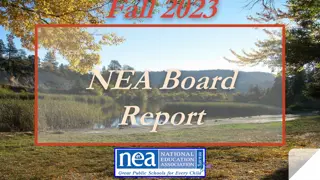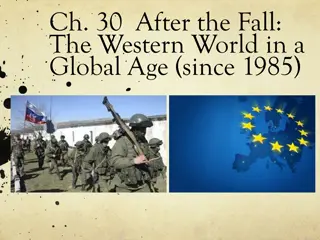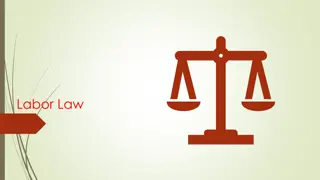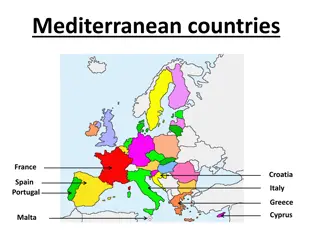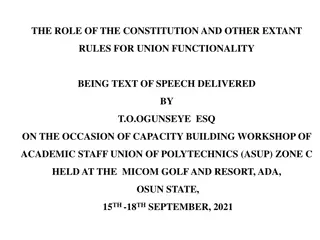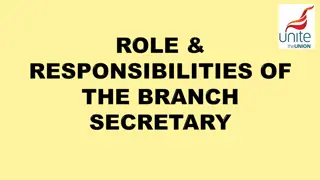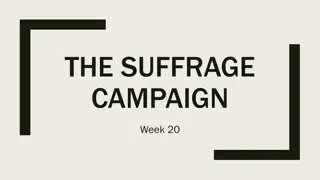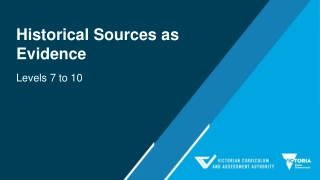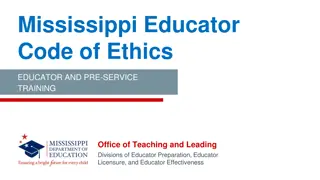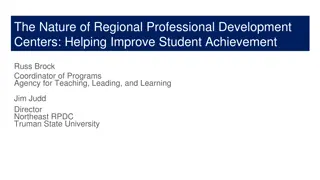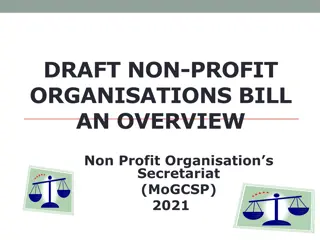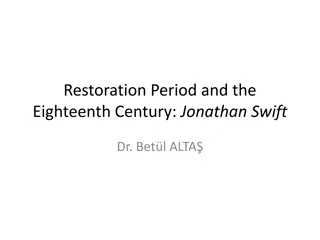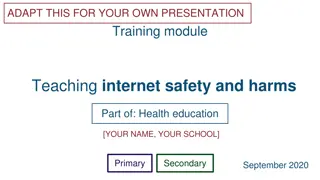Historical Background of the Professional Educators Union (PEU)
The Professional Educators Union (PEU) was established in 1906 by Mr. Sefako Mapogo Makgato to address injustices faced by African teachers, such as exclusion from pension funds and low salaries. Since its founding, PEU has been a beacon of hope for African educators, upholding core values of professionalism, loyalty, and integrity. With a membership of 9000, PEU aims to lead the education sector with diligence and professionalism, drawing inspiration from past leaders. Regionally, PEU is a member of ANTUSA, and internationally, it is part of Education International.
Download Presentation

Please find below an Image/Link to download the presentation.
The content on the website is provided AS IS for your information and personal use only. It may not be sold, licensed, or shared on other websites without obtaining consent from the author. Download presentation by click this link. If you encounter any issues during the download, it is possible that the publisher has removed the file from their server.
E N D
Presentation Transcript
HISTORICAL BACKROUND OF THE PROFESSIONAL EDUCATORS UNION (PEU), PRESENTED TO THE PORTFOLIO COMMITTEE ON BASIC EDUCATION DATE : 03 MARCH 2021 TIME : 09H30 MODE: ZOOM PLATFORM
The Professional Educators Union (PEU) was founded in 1906, by one of our country s renowned leaders, a teacher and community builder of note, Mr. Sefako Mapogo Makgato, in the former Transvaal , hence it formerly operated as the Transvaal United African Teachers Association (TUATA), until 1996, when it operated nationally. The following injustices of the past, meted against African Teachers, namely, exclusion of African Teachers from Pension Funds, Teachers low salaries and general conditions of service, Shortage of High Schools in their areas, Exclusion of Africans from War Allowance, given to government employees, which necessitated a formation of an organised labour movement to address the challenges faced.
From its inception, PEU remained a beacon of hope for African Teachers, as they manoeuvred and grappled with the harsh realities of Apartheid, in their quest to serve and liberate the black nation . PEU is founded on the following core-values, which have been our pillar of strength and fountain of aspirations to our members: Professionalism, Loyalty, Commitment, Fairness, Transparency, Respect, Dignity, Integrity, Honesty and Good Governance.
We pride ourselves to be associated with some of past country s leaders such SJJ Lesolang, Z Mothopeng, CAR Motsepe, DML Mphahlele, LM Taunyane , JK Dikobo, to name just a few from our list of former Presidents. Our membership is currently standing at nine-thousand (9000), with over 50% of our membership concentrated in Limpopo Province and the rest spread throughout our eight(08) provinces. We remain resolute as PEU leadership, in our quest to inculcate hardworking attitude in our members and encourage them to always execute their tasks with outmost diligence and professionalism, as custodians and embodiment of high moral ground in communities they ply their trade and always endeavour to make PEU the leading Union in the Education Sector.
Regionally, PEU is the founding member of the Association of Non-aligned Teacher Unions of Southern Africa (ANTUSA), constituted by Teacher Unions that are politically non- aligned in their respective countries. ANTUSA s membership is currently in Botswana, Lesotho, Mauritius , Namibia, RSA, Zambia and Zimbabwe. The Annual Games, Research, Teacher Exchange Programmes and Benchmarking are amongst ANTUSA s activities. Internationally, PEU is a member of Education International (EI).
Locally, PEU admitted to Bargaining Councils, namely, ELRC and PSCBC as a Combined Trade Union with ATU and SAPU, respectively. We are in close cooperation with other four teacher unions admitted to the ELRC and our unity of purpose is undoubtedlty a contributory factor to the labour peace and speedy resolutions to a number of challenges facing the Sector, from time to time.
CONCLUSION CONCLUSION As you are aware, the COVID-19 pandemic has ushered in a number of challenges and invariably dictates a new normal in the way we should go about in conducting our business, and education is not spared from this harsh reality. The pandemic has laid bare, existing inequalities in our schools, ranging from infrastructure to modern technology resources, with majority of rural and township schools being on the receiving side, as they could not comply with social distancing and at the same time continuing with normal business, due to severe shortage of classrooms, which consequently dictated that learners attend schools alternatively. This had a knock-off effect on the delivery of curriculum and perpetuated existing disparities in the Sector. We therefore make a passionate plea to the PC to move with speed, in prioritising the redress in our schools. Like other frontline workers, teachers are putting their lives in the firing line as they navigate through the pandemic but in return, their efforts seem to go unnoticed and unappreciated by the employer, as their salaries are targeted to resolve the current economic situation facing the country.



